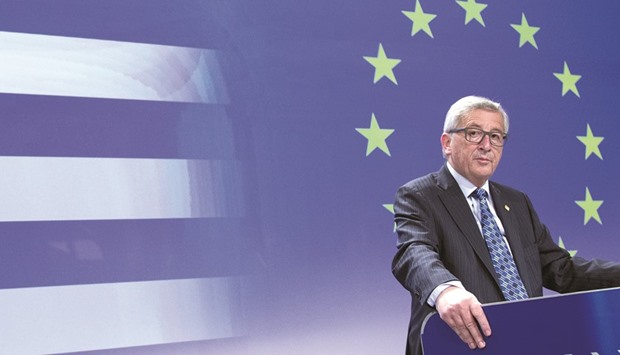European Commission President Jean-Claude Juncker told Germany’s Bild daily that Europe is making progress in tackling the migrant crisis and praised Chancellor Angela Merkel for sticking to “long-sighted” policies in the face of criticism.
In an interview published yesterday, a day before leaders hold a closely watched summit on the refugee crisis and on a reform deal to keep Britain in the 28-member bloc, Juncker said history would prove Merkel and her liberal refugee policy right.
Merkel is looking increasingly isolated with her demands for a fair distribution of migrants among EU members and for ensuring Turkey co-operates to stem the flow of people arriving in Europe.
Some EU members, including Hungary, Poland, the Czech Republic and Slovakia, are deeply opposed to any quota system and their leaders said this week that there should be tighter controls on the borders of Balkan countries neighbouring Greece if attempts to limit the numbers from Turkey to Greece failed.
Juncker told Bild a number of individual steps would together have an effect on the crisis but that this would take time.
“We are at last seeing some first progress,” he told Bild, adding the number of migrants arriving in Greece from Turkey was falling.
He said it was the job of a head of government to stand by their policies even under pressure and suggested Merkel would outlast all her critics.
“The European migration policies she and I are pursuing will prevail. It is political strength to say we can do it. Anything else is capitulation to the populists,” he said.
Support in Germany for Merkel has dipped over her handling of the crisis, opinion polls show.
Merkel aides said that the two-day EU summit starting today will not focus on a divisive quota system to distribute refugees among member states but on how to secure the bloc’s external borders to stem the flow of migrants.
Thomas Oppermann, parliamentary leader of the Social Democrats (SPD), Merkel’s junior coalition partner, said that a deal on the quota system must be reached before another EU summit in March.
He added that the absence of a deal by then could push member states, including Germany, to reinstate border controls within the free-travel Schengen area.
“We have consensus that the external borders must be safer but no consensus on common quotas,” Oppermann told the ARD broadcaster. “I believe that a deal must be reached until the summit in March. If we fail, I expect that all the internal borders will be renationalised and tighter border controls will occur all over Europe. Presumably in Germany too.”
Merkel has resisted demands from some members of her conservatives to shut Germany’s border with Austria to migrants.

Juncker: The European migration policies (Merkel) and I are pursuing will prevail.
